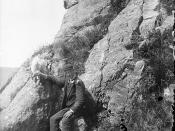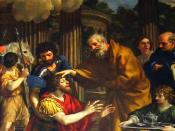The more we delve into history, examine our past, and study ourselves, the more we realize that our heritage is more complex than the universe itself. Although religion is tied into history more than history itself, it is very interesting to see how two scholars examine the past and question the validity of what so many believe today. The views of both authors, Ehrman and Crossan, are similar in their approach to Paul and his writings. Both authors agree that there is a lot of contradiction that goes inline with the fact that the New Testament is not a historical account of events. Ehrman concentrates on the truths and contradictions found within the writings by Paul, while Crossan looks at the big picture and asks why Paul wrote certain things the way that he did. In other words, Crossan takes the Titanic and looks and why it's sinking while Ehrman looks and how certain parts are broken, it seems that he does not know about the iceberg sometimes.
Ehrman undoubtedly gives Paul a lot of recognition; he starts out by stating that "next to Jesus himself, the apostle Paul was arguably the most important person in early Christianity." (285) Besides the fact that nearly half the New Testament books claim to be written by Paul, "...the Acts of the Apostles, sketches a history of early Christianity with Paul as the principal character." (285) Ehrman goes on to say that Paul's major contribution to early Christianity was the fact that he "...emphasized that faith in Jesus as the messiah who died for sins and was raised from the dead was not to be restricted to those who were Jews." (286)
Ehrman then steps onto a different ledge and begins to take apart the writings from Paul. He begins with Paul's letter to the Galatians and the book of Acts; both talking about Paul's trip to Jerusalem. In one instance (The Acts) Paul claims to have gone to Jerusalem, after Jesus' apparition, and in the letter Paul states that he did not go. Ehrman explains his reasoning for the contradiction, and states that Paul's lie in this case would have been "bold-faced." (289) In another example Ehrman talks about Paul's views on pagans and their understanding of God; it is clear that Paul is again contradicting himself. In the letter to the Romans Paul states that pagans are "...not ignorant of the one true God...[and] the worship of idols is said to be a willful act of disobedience." (289) In the Acts, however, Paul claims that the pagans' ignorance of the one true God is what keeps them from being "willfully disobedient to Him." (289)
Crossan, on the other hand, being a historical and anthropological buff views Paul and the spread of early Christianity from a viewfinder that can deeply offend some Christian Fundamentalists. He has an amazing ability to sort through the inaccuracies and additions of early writings and come out with the truth that really needs to be considered.
Crossan begins by mentioning two historical accounts, one from a Roman Jew - Flavius Josephus, and one from a pagan Roman - Cornelius Tacitus. After italicizing what he feels to be the inserted text by Christians, what comes out is an outline of events. That "there was a movement in Judea. Its founder was executed under Pontius Pilate. But the movement instead of stopping has now reached Rome itself." (162-3) Crossan then begins to question the theory of resurrection. He goes on to say that "They [Christians] could imagine Jesus being with God and returning with triumph but never have to mention resurrection at all." (163) This leads the reader to believe that the idea of resurrection had to have come from someone, and Crossan points the finger at Paul.
As early as Paul's writings to his founding churches, comes a letter he wrote to the Corinthians "...defending the possibility and actuality of bodily resurrection." (163) Crossan states that "Paul believed the end of the world was at hand...that it had already begun" and "bodily resurrection is the only way that Jesus' continued presence can be expressed." Crossan then makes the connection that Paul's "...emphasis on resurrection was but one way of expressing early Christian faith." (165) Crossan goes on to discuss the apparitions that Paul experienced, and explains his needs for having them. Crossan states that "Paul's experience of the risen Jesus certainly occurred in a trance." (168) And the fact that those apparitions have three different types of recipients leads Crossan to believe that the apparitions were "...quiet deliberate political dramatizations of the priority of one specific leader over another, of this leadership group over the general community..." (169) Crossan goes on to state that the apparitions "presume rather then create the Christian community; they are about how it will continue, not how it began." (169) I understand Crossan to say that Paul's writings, and the power they gave to the Christian leadership and to the Apostles' spiritual power over the community, is Paul's role in the spread of early Christianity.
From all the text above it's become evident that both authors agree with the fact that there is a lot of contradiction on what actually happened with Paul and the accuracy of his writing. However, after mentioning the dissimilarities Ehrman continues to base his study of Paul "principally on the undisputed Pauline epistles." (291) While Crossan's study of Paul is based on "cross-cultural anthropology" (xii) and the fact that Crossan "never builds on anything that has only a single independent attestation." (xiii) This leads me to believe that either Ehrman's thoughts have not gotten to Crossan's objective level, or that Ehrman simply does not agree with Crossan on the fact that the writings are written to give control to a minute leadership group that represented the leaders of early Christianity.
Finally, we need to consider the question of resurrection, and whether it is the "only way ...to express faith in the continuing power and presence of Jesus in the world." (165) The writers of the four canonical Gospels might say that if there was a general belief in the end of the world and Jesus was the "first fruits" then the rest of the people would eventually be raised. Following Paul's logic, that if Jesus wasn't raised then all the praying has been in vain, and none of the dead have been raised either. Since during that time people were still waiting for Jesus to comeback, the author of the Luke Gospel might say that without resurrection Jesus would not be able to come down from Heaven and join the people again. Therefore, the only way that Jesus would have been able to show himself to the Apostles was if he was raised. This is especially evident in Luke, where Jesus says "Look at my hands and my feet. It is I myself! Touch me and see; a ghost does not have flesh and bones, as you see I have." (24:39)
At the end, it is very difficult to put the traditional religious values aside to truly remain objective when it comes to religion. However, when taking into account both Ehrman's and Crossan's views it becomes clear that Paul had a very heavy hand in the beginnings of early Christianity. Whether it's from the literature written about him, the letters that he wrote, or the fact that half of the New Testament consists from his writings we can conclude that no matter what parts are true or false, no matter what reason they were written for, we need to give Paul the credit he deserves for ensuring the survival of one of the strongest religions in the world.


